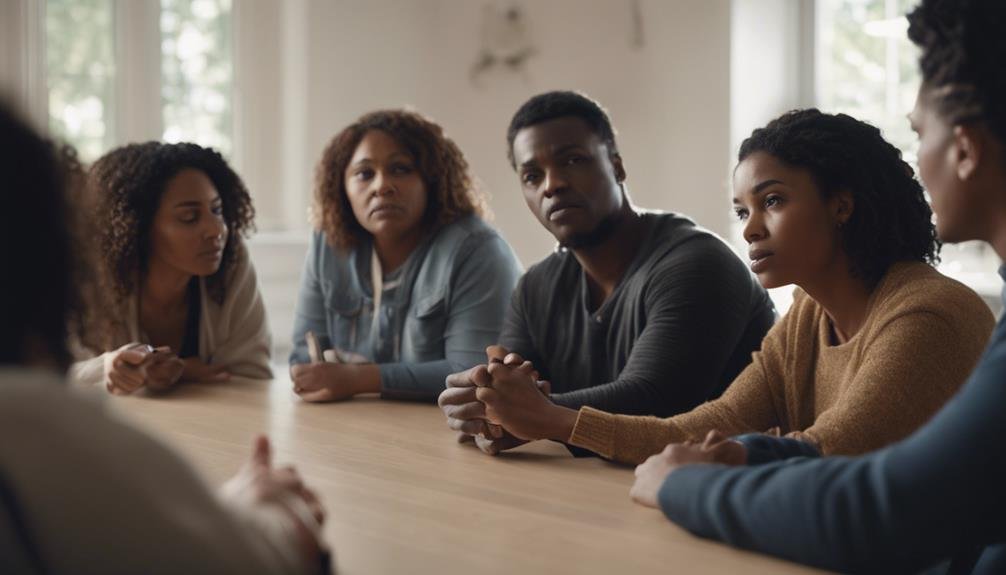Empower yourself with powerful strategies to prevent domestic violence. Educate on signs of abuse and prioritize healthy relationship dynamics. Implement legal measures and hold abusers accountable for safer environments. Cultivate tolerance, respect, and clear communication to foster mutual consent. Promote gender equality by inclusive prevention efforts. Engage in community initiatives and support groups for awareness and empowerment. Recognize and stop abuse by identifying warning signs and offering support. Provide training on recognizing and stopping abusive behaviors. Foster safe relationships and create supportive environments to prevent domestic violence. Learn more about these impactful strategies.
Key Takeaways
- Prioritize education and awareness to prevent domestic violence.
- Implement legal measures and consequences for abusers.
- Promote tolerance, respect, and clear communication in relationships.
- Advocate for gender equality to prevent domestic violence.
- Engage communities and provide support for prevention efforts.
Education and Awareness
To effectively prevent domestic violence, it’s essential to prioritize education and awareness as foundational pillars in fostering safer communities and relationships. Raising awareness about the prevalence and impact of domestic violence is vital in equipping individuals with the knowledge and tools to recognize, address, and prevent abusive behaviors. By educating communities on the signs of abuse and promoting healthy relationship dynamics, we can create a culture that doesn’t tolerate violence in any form.
Understanding the importance of prevention empowers individuals to break the cycle of abuse and cultivate environments where everyone feels safe and respected. Through education initiatives that highlight the damaging effects of domestic violence and provide resources for intervention and support, we can create a society that values empathy, communication, and mutual respect.
Legal Consequences for Abusers
Legal consequences for abusers are essential in holding them accountable for their actions. These measures, such as restraining orders and criminal charges, aim to protect victims and prevent future harm.
Understanding the legal repercussions for abuse is paramount in ensuring a safer environment for all individuals involved.
Abuser Accountability Measures
By imposing legal consequences on abusers, society can reinforce the message that domestic violence won’t be tolerated. Abuser accountability measures, such as restraining orders, criminal charges, and jail time, play an essential role in ensuring the safety of victims and deterring further abuse. These legal protections are vital in holding perpetrators accountable for their actions and preventing future harm.
The severity of the abuse often dictates the penalties, ranging from fines to imprisonment, in order to deliver justice and protect the vulnerable. Through these measures, the aim is to create a safer environment for all individuals, breaking the cycle of violence and promoting a society where domestic violence isn’t accepted.
It’s imperative to raise awareness about domestic violence and enforce strict legal consequences to safeguard victims, hold abusers responsible, and send a clear message that such behavior will face repercussions.
Punitive Actions Against Abusers
Implementing punitive actions against abusers can effectively deter future violent behavior and hold them accountable for their actions. Legal consequences such as jail time, fines, or restraining orders send a clear message that domestic violence won’t be tolerated. Research indicates that when abusers face legal repercussions, they’re less likely to repeat violent behavior. These consequences not only protect victims but also provide a sense of safety and justice in cases of domestic violence.
By enforcing punitive measures, we contribute to breaking the cycle of abuse and fostering a culture of respect and non-violence in relationships.
It is essential to understand that holding abusers accountable through legal means is a powerful tool in preventing domestic violence. By imposing consequences for their actions, we can create a safer environment for survivors and send a strong message that abusive behavior will have severe repercussions. Together, we can work towards a society where domestic violence isn’t only condemned but actively prevented through the enforcement of legal consequences for abusers.
Legal Repercussions for Abuse
Hold abusers accountable by enforcing strict consequences for their actions to deter future abusive behavior and prioritize victim safety. Legal repercussions for abuse can include criminal charges, restraining orders, and potential jail time. These consequences aim to not only punish the abuser but also to protect the victim from further harm.
In addition to fines and mandatory counseling, abusers may face the loss of custody or visitation rights. It’s essential for abusers to understand that violating protective orders or court mandates can lead to further legal sanctions and escalation of penalties.
Cultivating Tolerance and Respect

When it comes to preventing domestic violence, promoting empathy and understanding is essential.
By fostering healthy communication and encouraging mutual appreciation, you can create a foundation of respect in your relationships.
Promoting Empathy and Understanding
Promoting empathy and understanding plays an essential role in cultivating tolerance and respect, key elements in preventing domestic violence. By fostering empathy, individuals can better comprehend the feelings and perspectives of others, leading to more compassionate interactions. Understanding different viewpoints helps in valuing diversity and promoting inclusivity, creating a foundation for healthier relationships. Empathy encourages kindness and consideration, making it less likely for conflicts to escalate into violent situations.
Teaching the importance of empathy and understanding can notably reduce instances of abuse by promoting open communication and active listening. Encouraging individuals to communicate openly and listen attentively can prevent misunderstandings that may lead to conflicts.
Fostering Healthy Communication
Encouraging healthy communication is an essential aspect of fostering tolerance and respect in relationships, serving as a pivotal foundation in preventing domestic violence. By promoting open dialogue and active listening, you can create a safe space for understanding and empathy to flourish.
The National Domestic Violence Hotline emphasizes the importance of cultivating healthy communication patterns to reduce conflicts and discourage violence.
Building a foundation of mutual respect and acceptance is vital in fostering relationships based on equality and understanding. Through effective communication, you can address issues before they escalate into abusive behaviors.
Health in relationships relies heavily on the ability to communicate openly and respectfully. By honing your communication skills and promoting a culture of respect, you can prevent power struggles and control dynamics from taking root in your relationships.
Encouraging Mutual Appreciation
To create a foundation of mutual appreciation in relationships, prioritize fostering tolerance and respect as essential components in preventing domestic violence. Cultivating these qualities helps build understanding and empathy, fostering a culture of kindness and acceptance.
By encouraging respect for boundaries and consent, you can play a vital role in preventing abusive behaviors from taking root in relationships. When relationships are built on tolerance and respect, healthy communication and effective conflict resolution become the norm, reducing the likelihood of violence and harm.
Recognizing the signs of domestic violence early on and addressing them with empathy and support can help prevent escalation. By promoting mutual appreciation, you contribute to creating a safe and supportive environment where individuals feel valued and respected.
Ensuring Mutual Consent
Prioritize the establishment of mutual consent in your relationships as a foundational step towards preventing domestic violence and fostering a healthy dynamic with your partner. Ensuring mutual consent is essential in safeguarding against sexual violence and promoting a safe environment where both partners feel respected and valued.
By seeking and respecting consent in all interactions, you demonstrate a deep understanding of boundaries and personal autonomy.
Mutual consent serves as a protective shield against abusive behaviors and violations of personal rights, emphasizing the importance of clear communication and mutual agreement. It’s through the active practice of seeking and giving consent that you pave the way for a relationship built on trust, respect, and understanding.
Promoting Gender Equality

Establishing a foundation of gender equality is essential in preventing domestic violence and creating a safe environment for all individuals. Gender inequalities greatly elevate the risk of violence against women, highlighting the urgent need to address this issue.
It’s vital to recognize that men can also be victims of domestic violence, emphasizing the importance of inclusive prevention efforts that consider all genders affected.
Promoting gender equality is a key strategy in violence prevention. Even in cultures where women dominate, abuse can still occur, underscoring the necessity of fostering equality in all relationships.
Community Engagement Activities
Engaging with your community through collaborative initiatives is a powerful step towards promoting domestic violence prevention and creating a culture of safety and support for all. By participating in community engagement activities such as support groups, you’re actively contributing to raising awareness about domestic violence prevention and providing essential support for victims and survivors in your neighborhood.
These initiatives not only strengthen the bonds within the community but also promote a culture of respect, safety, and empowerment for all individuals involved.
Communities that take a stand against violence and actively work towards promoting healthy relationships play an essential role in preventing domestic violence. Establishing safe spaces, providing resources, and encouraging open dialogue are key components of community engagement activities in domestic violence prevention.
Your involvement in these activities can make a significant difference in creating a safer and more supportive environment for everyone in your community.
Recognizing and Stopping Abuse

You can play a vital role in recognizing and stopping abuse by being attentive to warning signs like jealousy, financial control, and threats of violence.
It’s important to take immediate action by calling the authorities if you witness violence and offering support to survivors in need.
Documenting incidents, raising awareness, and providing resources are proactive steps towards combating domestic violence.
Identifying Warning Signs
Recognizing and stopping abuse starts with being able to identify the warning signs of domestic violence. It’s vital to pay attention to behaviors like jealousy, controlling actions, and threats of violence.
If you notice someone experiencing these warning signs, it’s important to offer support and assistance. Encourage open communication and let them know they’re not alone.
It’s significant to document any incidents witnessed and provide a safe space for survivors to share their experiences. Keep contact numbers for shelters readily available and assist in creating escape plans if needed.
By raising awareness in the community about domestic violence, you can help prevent further harm. Remember to refuse to support media that glorifies violence and to be a resource for survivors in need.
Your compassion and understanding can make a significant difference in someone’s life. Together, we can work towards a future free from domestic violence.
Taking Immediate Action
Identifying signs of domestic violence, such as jealousy, financial control, and physical intimidation, is crucial in taking immediate action to stop abuse. When you witness violence, don’t hesitate to call the police and guarantee the safety of the survivor. Providing steadfast support to survivors without judgment can make a significant impact on their journey towards safety and healing. Keep contact numbers for shelters readily available and help survivors access the resources they need. Documenting incidents you witness can help survivors in legal proceedings and ensure accountability for the abuser.
Offer to research shelters and escape plans for survivors to help them shift to a safer environment. Refuse to support media that glorifies violence and consider organizing talks within community groups to raise awareness about domestic violence and promote change.
Providing Training on Abuse Prevention
Equip yourself with essential knowledge and skills by participating in training on abuse prevention. These programs are critical in the fight against domestic violence, as they provide individuals with the tools to recognize and stop abusive behaviors.
By understanding the cycle of violence, identifying warning signs, and developing safety plans, you can actively contribute to creating a safer environment for yourself and others.
Educating communities on domestic violence prevention is key to promoting early intervention and support for victims. Organizations that offer training programs play an essential role in fostering a culture of awareness and empowerment.
These sessions explore the root causes of domestic violence and advocate for healthy relationships, equipping participants with the necessary information to make a difference.
Fostering Safe Relationships

To cultivate safe and healthy relationships, it’s essential to prioritize open communication, trust, and mutual respect. Healthy relationships are founded on equality, support, and understanding between partners.
Prevention of domestic violence begins with educating individuals on the dynamics of healthy relationships. By fostering an environment where open dialogue is encouraged and where individuals feel safe to express themselves, the likelihood of abuse decreases markedly.
Promoting awareness and providing resources are vital steps in preventing domestic violence within communities. By empowering individuals with the knowledge and skills needed to recognize and address abusive behaviors, we can create a network of support that protects vulnerable individuals and promotes healthy relationship dynamics.
Together, we can work towards building a society where respect, trust, and communication are the cornerstones of all relationships, thereby fostering safe environments for all.
Creating Supportive Environments
Establishing a network of supportive resources and safe spaces is vital to fostering environments that reduce the likelihood of domestic violence occurrences.
Supportive environments play a pivotal role in preventing domestic violence by promoting open communication, providing assistance to victims, and offering avenues for seeking help.
Community engagement is essential in creating these supportive environments, as it encourages collaboration, awareness, and collective action against violence within neighborhoods. By engaging with the community, individuals can work together to identify risk factors, support survivors, and raise awareness about healthy relationships and conflict resolution.
Safe spaces within communities can also empower victims to come forward, seek help, and break the cycle of violence. Encouraging positive activities and engagement further contributes to lowering instances of violence by reducing stress and fostering healthier interactions.
Together, through supportive environments and community engagement, we can create safer, more respectful communities where domestic violence isn’t tolerated.
Frequently Asked Questions
What Are Six Strategies for Preventing Ipv?
Recognize signs of domestic violence like jealousy, control, and threats. Educate through community programs. Intervene early with kids to teach healthy relationships. Spread awareness through campaigns. Change laws to protect. Research for prevention.
Conclusion
You now have the power to make a difference in preventing domestic violence. By educating yourself and others, promoting respect and equality, recognizing abuse, and creating supportive environments, you can help break the cycle of violence.
Remember, every action you take, no matter how small, can have a big impact on those affected by domestic violence. Together, we can work towards a future where everyone feels safe and respected in their relationships.







